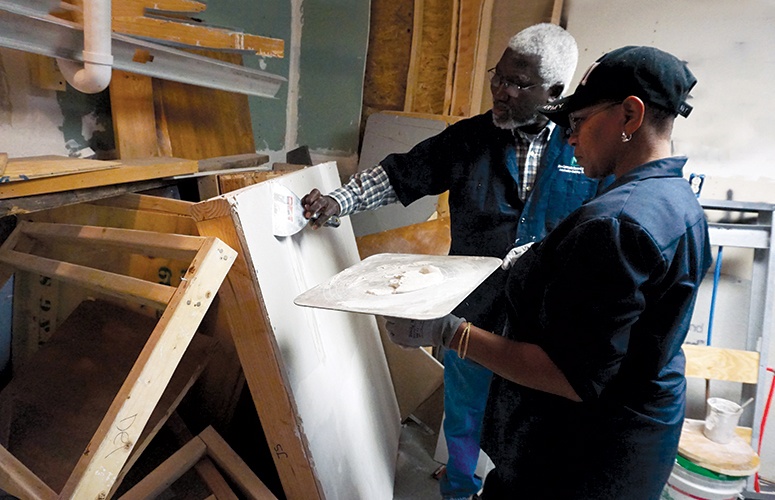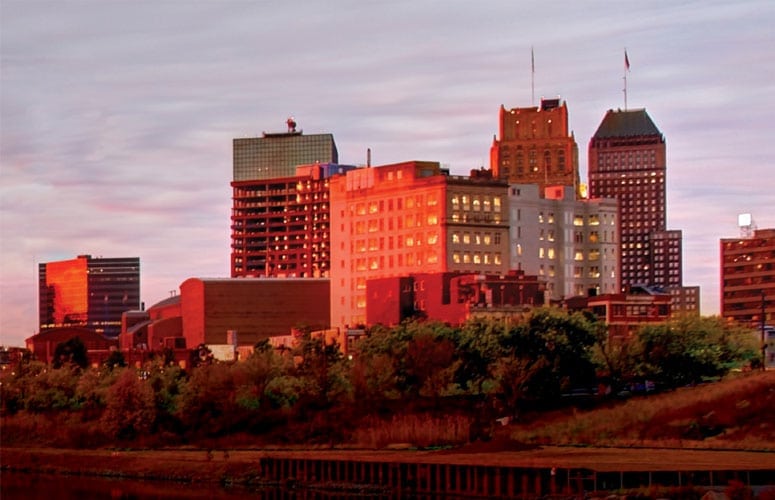
Organizations Committed to Enhancing Newark
Various organizations are facilitating initiatives that include job training programs, formal education and everything in between.
By George N. Saliba, Contributing Writer On Sep 18, 2023Workforce development initiatives promulgated by Newark-based public-sector and nonprofit entities are a lifeblood for city residents. And they are needed, as the U.S. Census Bureau cites that the city has a 25.8% poverty rate compared to New Jersey’s statewide 10.2% poverty rate. Some Newark-centric workforce-bolstering efforts include encouraging the city’s larger companies to hire local workers and locally procure goods and services, while other endeavors focus on traditional learn-and-graduate programs aimed at employing city residents who need to improve skills.
New Community Career & Technical Institute
The latter is especially the case at the New Community Career & Technical Institute, part of the nonprofit New Community Corporation (NCC), in Newark, where students can enroll in six- to nine-month programs centered on automotive repair training, the building trades, the culinary arts, or several allied health fields.
The programs have had both successes and challenges: On the one hand, NCC’s President and CEO Simone Gagneron describes how the automotive program is in the process of being reinvigorated via a yet-to-be-announced partnership with an international automotive group and, separately, that New Community’s allied health programs often yield graduates who pursue long-term healthcare careers by afterward gaining additional credentials. On the other hand, the institute’s matriculated students routinely face persistent personal challenges that can interfere with their program completion. These struggles can include childcare/parenting responsibilities as well as housing and food insecurity issues.
Newark City of Learning Collaborative
While the above technical training is valuable for those who seek opportunities in the trades, attaining college degrees and/or credentials beyond high school affords paths to other careers. This is fostered by the Newark City of Learning Collaborative (NCLC), whose aim is to ensure that “all Newark residents have the opportunity, information, and access to go to college, afford college, and ultimately obtain good jobs,” says Robyn Ince, Ed.M., executive director of NCLC and assistant professor of professional practice at the Department of Urban Education, Rutgers University-Newark. NCLC’s in-depth efforts are primarily focused in three areas: public awareness and mobilization, pre-college pathways, and policy advocacy.
There’s clearly work to be done: According to the U.S. Census Bureau’s American Community Survey, in 2021, 23% of those 25 or older in Newark had either an associate’s degree or a bachelor’s degree, compared to 50% of New Jersey residents (although there has been a 4% increase since 2019).
“In today’s economy, more than half of all jobs require a credential higher than a high school diploma or GED,” Ince explains. “For Newark to thrive, NCLC’s cross-sector partners support a shared goal of increasing the proportion of Newark residents with a degree or credential beyond high school to 25% by the year 2025, and ultimately sustaining Newark’s college-going culture well beyond.”
The Newark Board of Education
The student-learning process can arguably never begin too early: A separate entity – the Newark Board of Education – is engaged in myriad programs including Students 2 Science (S2S), led by Kathleen Tierney, S2S director at the Newark Board of Education (S2S in part provides hands-on laboratory experiences for students grades 8 through 11).
Tierney underscores that Newark schools have overall robust offerings in science, technology, engineering and mathematics (STEM); K-5 students not only take specific STEM classes apart from their regular science and math classes, but they also have access to programs that include robotics, for example, as well as a popular program titled “Girls Who Code.”
High school instruction becomes more specialized, where pathways can include biomedical and cybersecurity learning, and partnerships with industry and other organizations are part of the equation. Tierney adds overall, “I think it’s the exposure to [STEM] that … acts as the hook, and that’s where we’re kind of whetting [students’] appetites for what is to come.”
“What is to come” hopefully are careers, including but not limited to work lives centered on medicine, engineering and/or various sciences.
Invest Newark
If neither the trades, college nor STEM topics specifically interest prospective workers, entrepreneurship is another interrelated career path. Invest Newark, the city’s economic development agency, is an entity with many undertakings, one of which includes educational programs aimed at entrepreneurs. For example, its Language of Capital Series provides an introduction to personal and business finance, accounting principles, marketing, equipment financing, business plans, and more.
The organization’s educational programs are at times tiered: If an existing business has more than $100,000 in annual revenue, it can avail itself of the Executive Business Accelerator Program, which is offered twice annually via a partnership with Interise, and explores financial decision making, identifying and securing key talents, as well as developing a growth plan.
Various Invest Newark workshops also abound. The M/WBE certification, financial statements, social media marketing and online ordering workshops are all part of broader offerings designed to help entrepreneurial Newark residents succeed.
“The benefit [of these programs] for [Newark] is not only having a diversity of goods and services available to all residents, but it’s also about job creation; that’s very, very important for me, as I sit in this seat as the president and CEO here at Invest Newark,” says Marcus Randolph.
Randolph showcases the success of Invest Newark’s educational programs, but he also cautions that some individuals have arrived at the Language of Capital Series without a business plan, financials, or proformas; they may not have even established legal business entities. Randolph adds, “We’re working on a new set of offerings that we’ll probably roll out in 2024 to help them with some of that basic set up.”
The Urban League of Essex County
For Newark residents seeking what might be termed “learn-and-earn” job training, The Urban League of Essex County (ULEC) can help. Since 1917, it has aimed to help “African Americans and disadvantaged residents achieve economic and social advancement.” Within the workforce development/training realm, ULEC serves more than 500 people via initiatives, which include training in retail; hospitality and tourism; construction and utilities; and information technology. It also has strategic relationships with employers, including working relationships with more than 200 local employers.
One example of ULEC’s training? In the wake of the coronavirus pandemic, ULEC started a supply chain management program due to high demand for workers with associated skills. Overall, ULEC has a partnership with Essex County College, so it can pivot and respond to emerging employment trends.
“I like to say that we are nimble, and we’re responsive to what employers are looking for,” says Vivian Cox Fraser, president and CEO of ULEC. Among many specific programs, she mentions partnerships with PSE&G surrounding clean energy-related training, as well as separate programs in phlebotomy and essential IT skills.
Fraser keeps the organization on the cutting edge: “I tell everyone: What we did for the last 100 years won’t be what you do for the next 100 years. [Again, we are] responsive to the trends; you don’t know what’s around the corner.”
Newark Workforce Development Board
The Newark Workforce Development Board (NWDB) is also part of the city’s workforce development equation: Part government agency and 501(c)(3) organization, it “integrates publicly funded workforce service and job training programs into a system that is flexible, seamless, accountable, and responsive to the needs of both workers and businesses.” For example, this summer the NWDB launched the Summer Youth Employment Program featuring the 311 Carpentry Program, which the NWDB is sponsoring as a year-round work experience; it creates pre-apprenticeship opportunities for high school students who aspire to enter the skilled trades.
The Newark Alliance
Training/education may be one element of workforce development success, but The Newark Alliance arguably takes the 50,000-foot view as it leverages “the combined strength and collaboration of its members [to] drive inclusive economic growth for all of Newark.” One initiative involves having more Newark residents employed at the household-name companies that dot the city’s landscape, and to create training programs as well as “meet and greets,” etc., to help companies understand which people and/or businesses in Newark can help meet their hiring or procurement needs.
“We were successful; we’ve met our goals in both cases,” says Evan Weiss, president and CEO of The Newark Alliance. “Now we’re figuring out how we are going to rejigger this a little bit.” The Newark Alliance is, in part, focusing on high opportunity sectors such as healthcare and green-energy-economy type jobs.
Weiss says overall, “We talk about this so much in Newark that it’s become a part of the bloodstream: when we get a new corporation [to come here] – as we have in recent years – there’s an expectation that they participate in this culture of thinking about local hiring, local procurement, [and] thinking about their role in the city.”
Conclusion
Similarly taking a bird’s-eye view is Chip Hallock, president and CEO of the Newark Regional Business Partnership, a broad-based member organization committed to the success of its members and the revitalization of Newark.
Hallock says, “Population trends, the pandemic and its aftermath, a focus on equity, renewed appreciation for the trades, increased costs for higher education, the value of industry-recognized credentials – and more – have had significant impacts on employers and workers.”
He concludes, “These factors have led to creative and practical [workforce development] solutions from private- and public-sector employers, education and training suppliers, and non-profit organizations including the Newark Workforce Development Board.”
To access more business news, visit NJB News Now.






